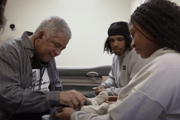A new pill quietly shows major results in the fight against cholesterol
- Replies 0
Disclaimer: The information provided in this article is for educational purposes only and is not intended as a substitute for professional medical advice, diagnosis, or treatment. Always consult your physician or other qualified healthcare providers with any questions you may have regarding a medical condition or before making any changes to your health regimen.
A new daily medication could soon shift how heart disease is managed in older adults.
The findings didn’t come from a big announcement or flashy marketing push—it came from a university-led trial halfway across the world.
For those who’ve struggled for years to bring their cholesterol down despite trying everything, the data may be the first real hope in a long time.
It’s a small pill with a long name: Obicetrapib.
A Phase 3 clinical trial out of an Australian institution found the drug may significantly lower bad cholesterol—and a harder-to-treat risk marker that has frustrated doctors for decades. The test involved over 2,500 people, with the average age being 65.
Every person involved either had heart disease or genetically high cholesterol. They were also already on the maximum dose of cholesterol-lowering medication.

Participants were divided into two groups: one received Obicetrapib, the other received a placebo. Everyone stayed on their existing medications. After just 12 weeks, those taking Obicetrapib saw their low-density lipoprotein (LDL) cholesterol—often called the "bad" kind—drop by 32.6%.
Even more notably, lipoprotein(a), or Lp(a), decreased by 33.5%. Those results were presented at a major cardiology event and published in the New England Journal of Medicine. Lp(a) is largely inherited and cannot be lowered with diet, exercise, or traditional medications.
Doctors have long considered it a stubborn and dangerous factor in heart disease, especially when combined with high LDL levels.
Professor Stephen Nicholls, who led the study, said: "We are aware that many individuals at high risk for heart attack or stroke fail to reach optimal cholesterol levels, even when utilizing the best available treatments."
He added that Obicetrapib could help patients who’ve already "exhausted available therapeutic options."
Also read: Is this everyday nut the secret to lower cholesterol and a healthier heart? Experts reveal surprising results!
The professor also emphasized that most people in the study were already using top-tier treatments before taking the new drug. This highlights the potential impact for those still struggling to reach target cholesterol levels despite their best efforts.
High LDL cholesterol has long been associated with narrowing arteries, which raises the risk of strokes and heart attacks.
While lowering LDL is already a critical goal, the reduction in Lp(a) is a bigger breakthrough. Unlike LDL, Lp(a) isn’t something that can be fixed with lifestyle changes. Its levels are set by your genes, and until now, no reliable method existed to bring them down.
That’s why this new development could be a game-changer for people at high genetic risk. The trial also noted that the medication was “well-tolerated.” No serious safety issues were reported during the 12-week testing window.
Also read: 6 dietitian-approved cereals that can help lower your cholesterol
Still, there are things this study didn’t prove. While cholesterol and Lp(a) levels fell, the study did not measure actual outcomes like reduced strokes or heart attacks. And participants weren’t selected based specifically on high Lp(a) levels—so we don’t yet know exactly how the drug performs in that subgroup.
Experts stress that more long-term data is needed to confirm that Obicetrapib actually reduces life-threatening events. It’s also not yet approved for use in the US.
Regulatory review is still ahead, which means cost, insurance coverage, and access all remain unanswered questions. If approved, Obicetrapib could provide a new option for people who've run out of options.
Read next: Cholesterol truths: what the experts say about keeping your heart healthy

Have you struggled with high cholesterol or heart disease? Are you taking statins or other medications, and have you experienced side effects? What questions do you have about new treatments like Obicetrapib? Share your stories, tips, and questions in the comments below—your experience could help others in The GrayVine community.
A new daily medication could soon shift how heart disease is managed in older adults.
The findings didn’t come from a big announcement or flashy marketing push—it came from a university-led trial halfway across the world.
For those who’ve struggled for years to bring their cholesterol down despite trying everything, the data may be the first real hope in a long time.
It’s a small pill with a long name: Obicetrapib.
A Phase 3 clinical trial out of an Australian institution found the drug may significantly lower bad cholesterol—and a harder-to-treat risk marker that has frustrated doctors for decades. The test involved over 2,500 people, with the average age being 65.
Every person involved either had heart disease or genetically high cholesterol. They were also already on the maximum dose of cholesterol-lowering medication.

A new daily medication could soon shift how heart disease is managed in older adults. Image Source: Jonathan Borba / Pexels
Participants were divided into two groups: one received Obicetrapib, the other received a placebo. Everyone stayed on their existing medications. After just 12 weeks, those taking Obicetrapib saw their low-density lipoprotein (LDL) cholesterol—often called the "bad" kind—drop by 32.6%.
Even more notably, lipoprotein(a), or Lp(a), decreased by 33.5%. Those results were presented at a major cardiology event and published in the New England Journal of Medicine. Lp(a) is largely inherited and cannot be lowered with diet, exercise, or traditional medications.
Doctors have long considered it a stubborn and dangerous factor in heart disease, especially when combined with high LDL levels.
Professor Stephen Nicholls, who led the study, said: "We are aware that many individuals at high risk for heart attack or stroke fail to reach optimal cholesterol levels, even when utilizing the best available treatments."
He added that Obicetrapib could help patients who’ve already "exhausted available therapeutic options."
Also read: Is this everyday nut the secret to lower cholesterol and a healthier heart? Experts reveal surprising results!
The professor also emphasized that most people in the study were already using top-tier treatments before taking the new drug. This highlights the potential impact for those still struggling to reach target cholesterol levels despite their best efforts.
High LDL cholesterol has long been associated with narrowing arteries, which raises the risk of strokes and heart attacks.
While lowering LDL is already a critical goal, the reduction in Lp(a) is a bigger breakthrough. Unlike LDL, Lp(a) isn’t something that can be fixed with lifestyle changes. Its levels are set by your genes, and until now, no reliable method existed to bring them down.
That’s why this new development could be a game-changer for people at high genetic risk. The trial also noted that the medication was “well-tolerated.” No serious safety issues were reported during the 12-week testing window.
Also read: 6 dietitian-approved cereals that can help lower your cholesterol
Still, there are things this study didn’t prove. While cholesterol and Lp(a) levels fell, the study did not measure actual outcomes like reduced strokes or heart attacks. And participants weren’t selected based specifically on high Lp(a) levels—so we don’t yet know exactly how the drug performs in that subgroup.
Experts stress that more long-term data is needed to confirm that Obicetrapib actually reduces life-threatening events. It’s also not yet approved for use in the US.
Regulatory review is still ahead, which means cost, insurance coverage, and access all remain unanswered questions. If approved, Obicetrapib could provide a new option for people who've run out of options.
Read next: Cholesterol truths: what the experts say about keeping your heart healthy
Key Takeaways
- A new daily pill, Obicetrapib, showed promising results in reducing LDL cholesterol and lipoprotein(a) in people already on maximum therapy.
- The trial included over 2,500 adults with heart disease or genetically high cholesterol, showing a 32.6% LDL drop and 33.5% Lp(a) reduction in just 12 weeks.
- Lipoprotein(a), a major inherited heart disease risk factor, has been difficult to treat until now.
- Though well-tolerated, further studies are needed to confirm long-term safety and real-world impact on heart attack or stroke rates.






